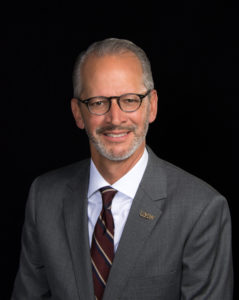UMW President Troy D. Paino covered the past, present and future during a state-of-the university address this week. The start-of-semester assembly focused on building a “sense of community and common purpose” across Mary Washington’s three campuses.
Now in his 19th month at UMW, Paino introduced his eight-member leadership team, calling particular attention to two new appointments. Associate Vice President of Human Resources and Affirmative Action Sabrina Johnson will assume the newly created cabinet-level position of vice president for equity and access and chief diversity officer. Former Dean of the College of Business Lynne Richardson has been named vice president for administration and finance, and CFO, a role she has filled on an interim basis since last summer.
Paino highlighted progress in investment priorities, including salaries and tuition assistance, computer replacement, marketing, and renewed focus on continuing and professional studies. He also shared the institution’s initial success in rebuilding its financial reserves, helping shore up UMW’s safety net and protection against economic uncertainty.
He praised UMW employees for engagement and commitment to campus improvements. In particular, he cited their feedback rates on a campus climate survey and on the strategic vision, as well as their participation on committees, such as the diversity and inclusion task force and the president’s advisory committee on wellness, as being extraordinarily high.
“It’s so critically important to us in terms of knowing your thoughts and helping us as we create the vision and the plan moving forward,” he said.
UMW’s strategic vision, “An Investment of Hope for the Future,” which was announced last August and approved by the Board of Visitors in November, emphasizes service, community and civic engagement, applied and impactful learning experiences, reimaging the liberal arts for a digital age, and creating a diverse and inclusive community.
Paino also touched on budget issues, discussing former Governor McAuliffe’s proposals for the current fiscal year and their implications for UMW, as well as the governor’s proposal for state salary adjustments in November 2019. While the full impact of state funding for next year is still unknown, the President and Cabinet identified fiscal priorities with wide-ranging campus benefits – compensation, enrollment, career and professional development, disability resources, rebuilding reserves and more. Paino called upon the Mary Washington community to find creative ways to identify efficiencies, make progress, and increase UMW’s momentum regardless of state funding decisions.
Current and planned campus construction, including up-and-running projects such as the amphitheater rehabilitation and the Jepson Science Center expansion, and the forthcoming Willard and Seacobeck halls renovations, are critical steps forward. Paino also unveiled an ambitious vision for future capital projects to be undertaken by 2025, such as the creation of a new theatre, renovation of duPont, Pollard and Melchers halls to accommodate growing art and music departments, renovation of Virginia Hall and the William Street apartments, enhancements for Simpson Library, construction of a new parking deck, and building of a locker room on the Battleground Complex. These capital improvements will be essential to the ongoing growth of the University and recruitment of top students, he said.
Paino highlighted enrollment success this year, sharing the dual benefit of improved financial flexibility and growth in the academic profile of students. An across-the-board upswing, with increases in undergraduate, graduate, transfer and underrepresented students, was complemented by strong increases in SAT scores.
Likewise, rising freshman-to-sophomore retention rates further demonstrate UMW’s progress. The President called upon each member of the community to commit themselves to retaining UMW students by removing arbitrary barriers to degree attainment and creating an environment that allows students to thrive.
“We can all benefit from and hopefully achieve what your hopes and dreams are here at Mary Washington if we all work together,” he said. “We can do it. We can get there.”
